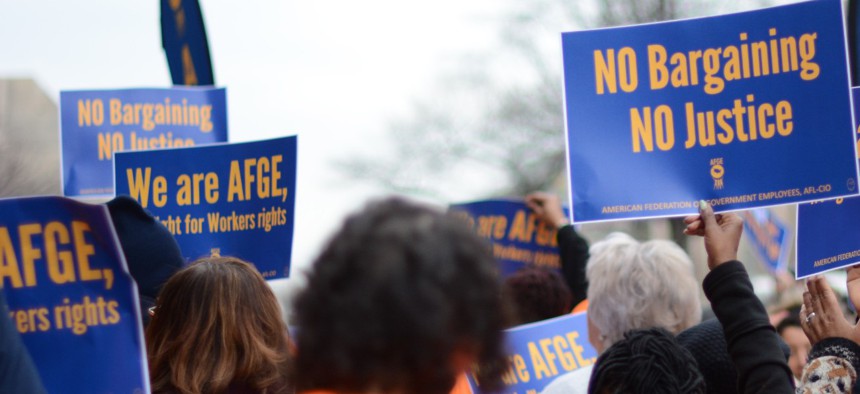
Chelsea Bland / AFGE
Labor Authority Moves Forward With Plan to Make It Easier for Feds to Cancel Union Dues
Lone Democrat on the labor-management relations board accuses his colleagues of using recent Supreme Court precedent as a pretext to enable union busting.
The Federal Labor Relations Authority announced last week that it would move forward with a controversial proposal to make it easier for federal employees to cancel automatic union dues collection, over the objections of labor groups and the agency’s lone Democratic appointee.
Last year, the FLRA, which oversees labor-management relations across the federal government, sought comments on whether to change its policy on how agencies should collect union dues, at the behest of the Office of Personnel Management. Both agencies questioned whether the current practice, where union members have a 15-day period once per year when they can opt out of paying dues, runs afoul of the recent Supreme Court decision Janus v. American Federation of State, County and Municipal Employees.
The Janus decision found that unions in state and local government could no longer charge so-called “agency fees,” whereby non-members are forced to pay a labor organization for representational work, because they violate the First Amendment. In a Feb. 14 policy statement, the FLRA said it would change its interpretation of federal labor law to allow employees to cancel their union dues at any time, provided it has been at least one year since they first elected to join a labor group, effectively overturning nearly 40 years of precedent.
“The authority has held [in the past] that the wording in [the statute] that ‘any assignment may not be revoked for a period of one year’ must be interpreted to mean that authorized dues allotments may be revoked only at intervals of one year,” Chairwoman Colleen Duffy Kiko wrote. “We disagree. The most reasonable way to interpret the phrase . . . is that the phrase governs only the first year of an assignment.”
FLRA Member Ernest DuBester, the lone Democrat on the board, issued a scathing dissent, accusing his colleagues of using the Janus decision as a pretext to hamstring labor groups.
“The short answer to [OPM’s] request is that Janus requires no such reevaluation,” DuBester wrote. “Indeed, the authority’s decision here does not contain a scintilla of legal analysis connecting its conclusions to the Supreme Court’s decision. This omission is not inadvertent. Janus focuses exclusively on the constitutionality of ‘agency fee’ payments required of employees who are not members of a union to support activities germane to a union’s duties as the exclusive bargaining representative.”
DuBester noted that in Janus, Justice Samuel Alito actually lauded the way dues are collected by federal employee unions as a constitutional way to run so-called “open shop” collective bargaining. Multiple federal courts have dismissed lawsuits in which federal workers tried to cease paying union dues outside of the 15-day opt-out period, concluding Janus does not apply in these situations.
“The federal employment experience is illustrative,” Alito wrote. “Under federal law, a union chosen by majority vote is designated as the exclusive representative of all the employees, but federal law does not permit agency fees. Nevertheless, nearly a million federal employees—about 27% of the federal workforce—are union members.”
The legislative history suggests Congress specifically intended that union members should agree to pay dues at one-year intervals, not merely for the first year, as the FLRA now argues.
“The House Committee Report accompanying the language . . . explains that this language ‘reflects a compromise between two sharply contrasting positions which the committee considered: no guarantee of withholding for any unit employee and mandatory payment by all unit employees,’” DuBester wrote. “The committee report further indicates that . . . dues assignments ‘normally are to be irrevocable for one year.’”
Despite the policy statement, the FLRA said that the union dues procedures will not change immediately. The agency stated that it will go through the normal process of proposing and implementing new regulations sometime “in the near future.”
In a statement, American Federation of Government Employees National Secretary-Treasurer Everett Kelley decried the measure as “union busting.”
“This meritless decision flies in the face of decades of settled and well-reasoned legal precedent in an activist effort to divide federal employees from their unions,” Kelley said. “It’s part of a pattern of behavior by this administration that shows no respect for federal employees’ voluntary choice, their union contracts, or their rights under the law. This administration seems ready to do anything for the sake of diminishing agency accountability and silencing unions and the employees we represent.”







